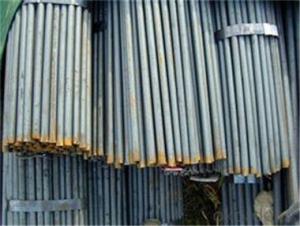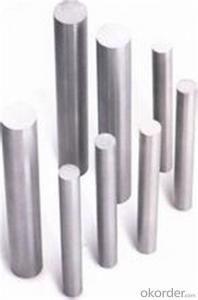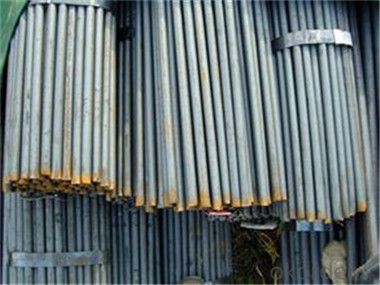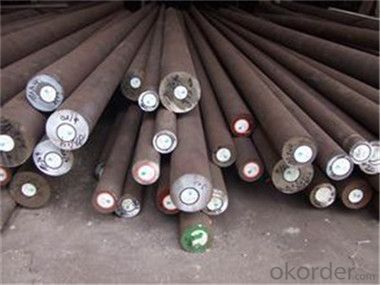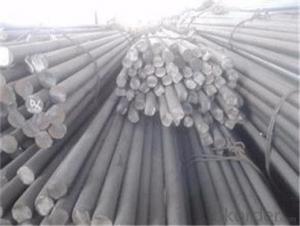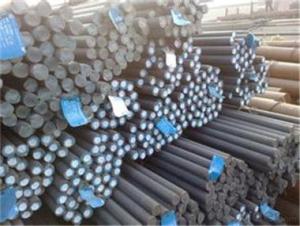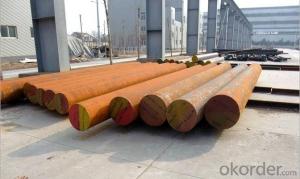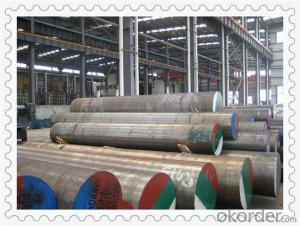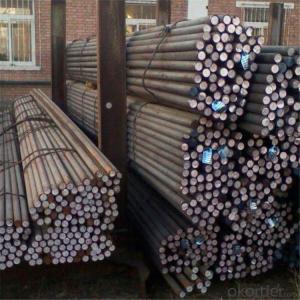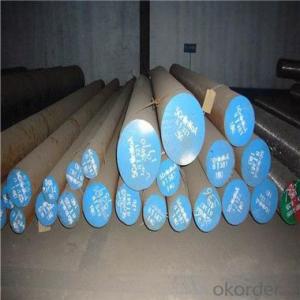C45 / SAE1045 / 45# Forged Steel Round Bars
- Loading Port:
- Dalian
- Payment Terms:
- TT OR LC
- Min Order Qty:
- 200 m.t.
- Supply Capability:
- 20003332 m.t./month
OKorder Service Pledge
OKorder Financial Service
You Might Also Like
Description of steel round bar:
1. Commodity: Round steel bar
3. Technical: Hot rolling
2. Length: Min. 5.8meter, according to requirement.
3. Diameter: 16mm-250mm
Festures of steel round bar:
Main products | |
Hot work tool steel | |
DIN | 1.2344,1.2343,1.2365,1.2581,1.2367,1.2714 etc. |
AISI | H13,H11,H10,H21,L6 etc. |
JIS | SKD61,SKD6,SKD5,SKT4 etc. |
Cold work too steel | |
DIN | 1.2601,1.2379,1.2080,1.2363,1.2842,1.2419,1.2510,1.2550,1.2767 etc. |
AISI | D2,D3,A2,O2,O1 etc. |
JIS | SKD1,SKD11,STD12,SKS31,SKS3 etc. |
Plastic mould steel | |
DIN | 1.2083,1.2311,1.2312,1.2316,1.2738 etc. |
AISI | P20, P20+Ni,P20+S,420 etc. |
JIS | NAK80 |
High speed tool steel | |
DIN | 1.3355,1.3343 |
AISI | T1,M2 |
JIS | SKH2,SKH51 |
Structural alloy steel | |
DIN | 1.7225,1.6511 |
AISI | 4140,4340 |
JIS | SCM440 |
We also supply customized special steel, contact us for more information ! | |
Specifications of steel round bar:
20CrMnTiH series, 20CrH-20CrH, 20CrMoH-42CrMoH, CrMnMoH series, CrNiMoH series, 20CrNi3H, MnBH series, SCr415H-SCr440H, SCM415H-SCM440H, 8620H-8627H, 4120H-4145H, 4320H,4340H, 5137H, 15Ni4Mo, 15CrNi6, 16CrNi4, 19CrNi5, 17CrNiMo6, 34CrNiMo6, 25CrMo4, 42CrMo4, 49CrMo4, 30CrMoV9, 16MnCr5,20MnCr5, 28MnCr5, 16CrMnBH, 17CrMnBH, 18CrMnBH, etc.
Images of steel round bar:
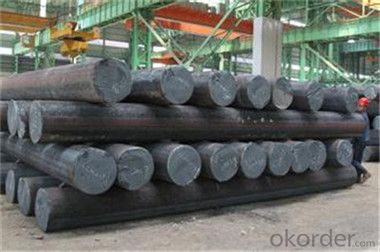
FAQ:
1. What is your package?
Packing situation: standard seaworthy packing or as customer required.
2. How long is the lead time?
Delivery time: 45 days after order confirmed.
3. What payment term do you accept?
Payment: T/T or L/C at sight.
- Q: What are the advantages of using titanium-alloy steel round bars?
- The advantages of using titanium-alloy steel round bars include their exceptional strength-to-weight ratio, excellent corrosion resistance, and high temperature resistance. Additionally, titanium-alloy steel round bars offer improved durability, better fatigue resistance, and are suitable for various industries such as aerospace, automotive, and medical, where lightweight and high-performance materials are required.
- Q: How are steel round bars used in the manufacturing of heat exchangers?
- Due to their unique properties, steel round bars are commonly utilized in the production of heat exchangers. These devices are responsible for transferring heat between multiple fluids, and the inclusion of steel round bars is essential to their construction. One primary application of steel round bars in heat exchangers is in the manufacturing of the tubes. These tubes are responsible for carrying the fluids that require heating or cooling. Steel round bars are frequently chosen as the base material for these tubes due to their exceptional heat transfer properties and high strength. The round shape of the bars facilitates the easy fabrication of the tubes, ensuring a secure and snug fit. Moreover, steel round bars are utilized in the construction of the headers and tube sheets in heat exchangers. The headers enable the fluid to enter and exit the heat exchanger, while the tube sheets hold the tubes firmly in place. These components must possess durability and high strength to withstand the pressure and temperature differentials encountered during heat exchange. Steel round bars provide the necessary stability and strength to ensure the proper operation of the heat exchanger. Furthermore, steel round bars are also employed in the manufacturing of the support structures or frames of heat exchangers. These structures offer stability and support to the various components of the heat exchanger, ensuring proper alignment and positioning. Steel round bars exhibit excellent structural integrity and can endure heavy loads, making them an ideal choice for this purpose. In summary, steel round bars play a vital role in the production of heat exchangers. Their high strength, excellent heat transfer properties, and durability make them well-suited for fabricating the tubes, headers, tube sheets, and support structures of heat exchangers. By incorporating steel round bars, manufacturers can guarantee the efficiency, effectiveness, and longevity of heat exchangers in numerous industries, including power generation, chemical processing, and HVAC systems.
- Q: Can steel round bars be used in the production of musical instruments?
- Certainly! Musical instruments can indeed be produced using steel round bars. Steel, being a versatile material, possesses a wide array of desirable attributes including strength, durability, and resonance. Although wood is typically the go-to material for crafting musical instruments, steel can be utilized in specific instances to augment the instrument's sound and performance. For instance, steel round bars can be implemented in the fabrication of various components such as keys or valves for wind instruments like saxophones or trumpets. Moreover, these bars can be employed to construct the internal support systems in instruments like guitars or cellos, thereby providing stability and enriching tonal qualities. Furthermore, steel round bars can be employed in the construction of percussion instruments such as steel drums or xylophones, where their robust and resonant attributes are highly sought after. On the whole, although wood remains the more prevalent choice in the realm of musical instrument production, steel can certainly be employed in specific scenarios to attain desired sound characteristics and structural integrity.
- Q: What is the thermal conductivity of a steel round bar?
- The thermal conductivity of a steel round bar can vary depending on the specific type of steel and its composition. Generally, carbon steel has a thermal conductivity ranging from 26 to 48 watts per meter-kelvin (W/m·K), while stainless steel typically has a slightly lower thermal conductivity of 15 to 27 W/m·K. However, these values are approximate and can vary based on factors such as temperature, impurities, and alloying elements. It is important to note that thermal conductivity is a property that describes the material's ability to conduct heat and is usually measured in units of W/m·K.
- Q: Can steel round bars be coated with protective coatings?
- Yes, steel round bars can be coated with protective coatings. These coatings are commonly used to enhance corrosion resistance, improve surface hardness, and provide a barrier against environmental factors such as moisture, chemicals, and UV radiation. The protective coatings can be applied through various methods such as galvanizing, epoxy coating, or powder coating, depending on the specific requirements and intended application of the steel round bars.
- Q: What are the different types of heat treatment for steel round bars?
- There are several types of heat treatment for steel round bars, including annealing, normalizing, quenching, tempering, and case hardening.
- Q: What are the different types of steel round bar surface coatings?
- Some of the different types of steel round bar surface coatings include galvanized coatings, epoxy coatings, powder coatings, and chrome plating.
- Q: Are steel round bars suitable for high-temperature applications?
- Yes, steel round bars are suitable for high-temperature applications. Steel is known for its excellent strength and heat resistance, making it a reliable choice for various industries that require materials capable of withstanding elevated temperatures. Steel round bars can maintain their structural integrity and mechanical properties even under extreme heat conditions, making them a popular choice for applications such as furnace components, heat exchangers, and high-temperature machinery.
- Q: Can steel round bars be used in the production of tools?
- Yes, steel round bars can be used in the production of tools. Steel round bars are commonly used in tool manufacturing due to their high strength, durability, and versatility. They can be shaped, machined, and heat-treated to create various types of tools such as drills, punches, chisels, and hammers. The use of steel round bars ensures that the tools have the necessary hardness and toughness required for their specific applications.
- Q: How do you calculate the moment of inertia for a steel round bar?
- The moment of inertia for a steel round bar can be calculated using the formula for the moment of inertia of a solid cylinder, which is given by I = (1/4)πr^4, where I is the moment of inertia and r is the radius of the round bar.
Send your message to us
C45 / SAE1045 / 45# Forged Steel Round Bars
- Loading Port:
- Dalian
- Payment Terms:
- TT OR LC
- Min Order Qty:
- 200 m.t.
- Supply Capability:
- 20003332 m.t./month
OKorder Service Pledge
OKorder Financial Service
Similar products
Hot products
Hot Searches
Related keywords
